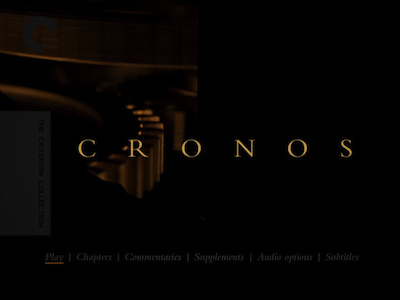
Guillermo del Toro's 1993 debut, Cronos, is a loopy tale from the dark side. It's a macabre horror story, but more from the "spooky yarn for a rainy night" school than the nubile gore and splatter that passes for fright fests most of the time these days. Shot in Mexico on a $2 million budget, it fits neatly into a tradition of first-timers injecting their low-grade genre pictures with every meaningful aspiration they can muster. Think back to the heydays of Roger Corman, when young directors would cut their teeth on his cheap backlot, or more recently, Sam Raimi. Guillermo del Toro is practically an institution now, thanks to movies like Pan's Labyrinth [review] and the Hellboy franchise [review of II], but this is where it all got started.
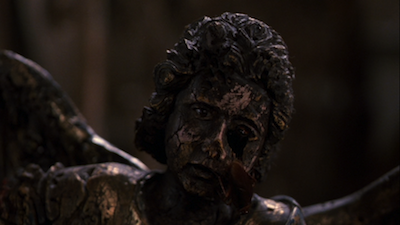
Cronos begins much like a storybook, evoking the horror fiction that del Toro draws his inspiration from. We are told that centuries prior, an alchemist experimenting with terrible secrets stumbled onto something extraordinary, building a device called the Cronos. Two-hundred years later, that same alchemist was killed in a freak accident. No one could explain how he was still alive, and the Cronos gadget was nowhere to be found.
Jump ahead in time further, and a junkie spots a statue of an archangel in a second-hand shop in Mexico. Knowing there is a man who will pay for such a piece of information, the junkie rushes to a pay phone, but not before alerting the store's owner to the importance of the damaged sculpture. The old shopkeeper, Jesús Gris (Federico Luppi), and his granddaughter Aurora (Tamara Shanath) unwrap the curio, and in cleaning out the cockroaches that are living inside it, find a small metal egg. Jesús turns a dial on the golden object, and spider legs emerge, clamp down on his hand, and a stinger stabs into his palm. The old man has no idea what he has stumbled on.
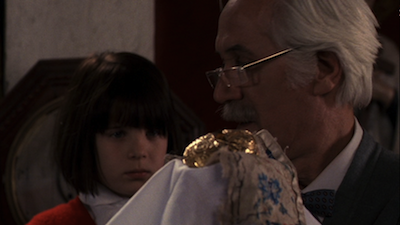
The man who sent the junkie does, however. De la Guardia (Claudio Brook) is a fellow of many riches, but health is not one of them. He has been buying every angel statue he can find hoping to locate the missing Cronos so he can use it to beat the many ailments that plague him. When he gets a tip, he sends his gorilla-like nephew, Angel (del Toro-regular Ron Perlman) to buy it. He has the alchemist's book of instructions about the Cronos, including a sketch of what the right statue looks like. Angel buys this one like always, but even though it finally matches the drawing, the true treasure is already gone.
Long story short, the Cronos is a tool that grants eternal life, but one that must constantly be maintained. I won't explain exactly how it works, there are some details best left to your own discovery for your first viewing, but in simple terms, it drinks your blood and then you are possessed of a need to replace that blood, creating an endless flow of life force. This is why Cronos is sometimes labeled as a vampire movie, though Jesús Gris is as far afield from Dracula and Nosferatu as the "zombies" in 28 Days Later
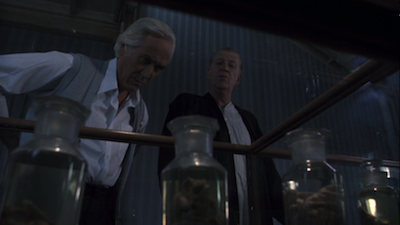
Cronos is an inventive, literate psychological fairy tale, except one that turns the fairy tale convention upside down by making it about two old men rather than the folly of innocence. Though there is an element of that, too; the lesson learned here is for the innocent, the little girl who silently observes. The granddaughter, though she does not speak, is a constant presence, serving as a conscience for her grandfather, who literally holds temptation in his hands. The things children see that adults cannot is one of the many thematic threads that run through all of Guillermo del Toro's Spanish language movies, though in The Devil's Backbone
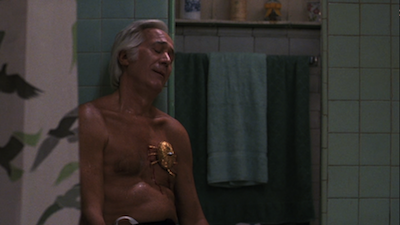
Not everything in Cronos works. Some of del Toro's writing is a little too on the nose. Perlman's character being named Angel might have been fodder for some amusing irony had the angel statues he is collecting for his uncle not made the symbolism obvious. Worse is the first time you hear the full name "Jesús Gris" spoken out loud. I think I actually groaned. Sometimes del Toro overdoes his visual symbolism, too. Clocks appear here and there throughout the movie, reinforcing the importance of time, sometimes in a good way, sometimes it's too much. The man in the clock costume at the New Year's Party is a neat idea, but the violent climax in front of a big clock face doesn't just fail on a textual level, the set looks cheap.
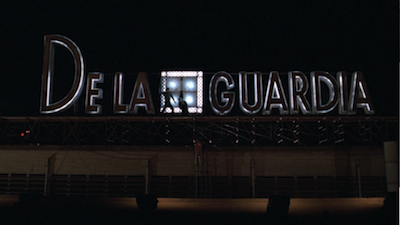
I'm willing to forgive the big set piece not looking so great, though, because del Toro puts his money where it counts. The make-up for the various states of Jesús' metamorphosis is fantastic, with the right touches of gore and gristle to make it believable, stomach churning, and even a little funny. Even better is the Cronos device itself. The old school effects on the machine are flawless, with the rudimentary toy-like mechanics of the object being perfect for a contraption that is over 400 years old. It moves and clicks and whirrs, and in an ingenious move, del Toro takes us inside the device, showing us its tiny gears and other, shall we say, parts from the inside. Letting us see the miniature interior up close this way makes it seem giant, as befitting its truly awesome powers. The hand-made props also appear more otherworldly than more contemporary computer effects usually do, as if this thing were the product of another fearsome dimension.
Federico Luppi is good as Jesús. He underplays the role rather than going over the top with it, and that makes his transformation all the stronger. It also keeps some of the more grotesque elements from being comical when they shouldn't be (licking blood off a bathroom floor) and adds to the black comedy when its pertinent (the corpse in the backwards suit). The villains are a little too cartoony to be truly menacing, but the Cronos provides its own menace, so the movie does have a dark flavor when required.

These are humble beginnings, to be sure, but Cronos definitely points the way for the Guillermo del Toro that is to come. Even with its rough edges, Cronos is thoroughly entertaining and surprisingly thought provoking. As with any truly good horror story, it makes us question what we would do in such a situation. Every adult character here has his own selfish goals, even if the selfishness emerges unexpectedly. If we were in the same situation as Jesús, would we not take advantage? Is the way he stubbornly wants to hold on to the Cronos for himself any better than De La Guardia's obsessive by-any-means-necessary search for it? I would say no, which is why Jesús' redemption comes with such a high penalty.
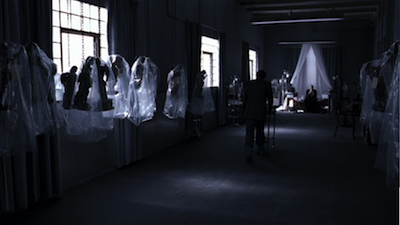
Taking us further back to del Toro's beginnings is the inclusion of the director's early short, Geometria. This six-and-a-half-minute film was begun in 1987, when the director was in his early 20s, but never completed to del Toro's satisfaction until it was unearthed for this DVD release. He cleaned it up, dubbing the soundtrack into Italian doing all the voices himself, as his homage to Lucio Fulci and Mario Bava. The blood-and-guts short subject features a teenager calling on a demon, essentially because he hates his homework. And, well, you know what happens when you waste a demon's time, don't you?
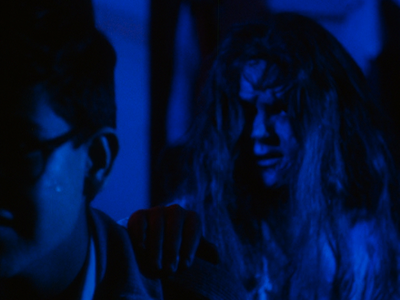
Also of note for del Toro fans is a short featurette called Welcome to Bleak House. This is a video tour of the scare master's work space, a second home away from home where he stores his toys, trinkets, art, and books. The whole place is set up as a museum/work environment, with hidden rooms, a screening area, and an art space. Collectors and fanatics will definitely drool over a lot of the stuff here, and after watching it, del Toro's brief connection with a Disney reboot its Haunted Mansion franchise makes a lot more sense.
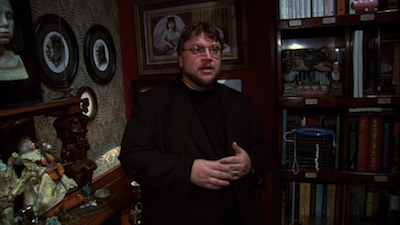
The Criterion Cronos package, which is available on both regular DVD and Blu-Ray, is filled out by two commentaries, various interviews, and a stills gallery and a booklet with some of del Torro's early notes for the movie. Hellboy fans will also be excited to see that the comic book's creator, Mike Mignola, did the cover illustration, as well as a two-part illustration for the interior book. Actually, it's four parts, because the inside works in conjunction with the cover, and even the art on the surface of the disc brings you in closer, showing us the exposed Cronos and its hiding place inside the heavenly statuary. It's like opening a treasure and digging down deep into the chest. Fantastic.
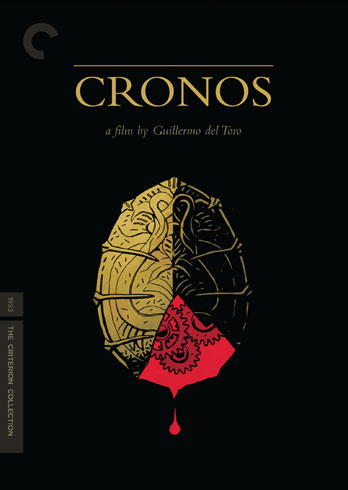
This disc was provided by the Criterion Collection for purposes of review.

No comments:
Post a Comment